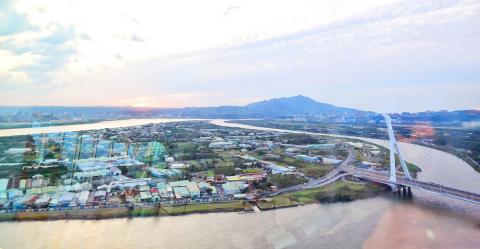Development of the Shezidao (社子島) peninsula in Taipei’s Shilin District (士林) is still up in the air, despite residents voting to support Taipei Mayor Ko Wen-je’s (柯文哲) plan to turn the area into an “Ecological Shezidao,” because there remains a difference of opinion over the details of the redevelopment plan.
Results of the poll, which began on Saturday and ended on Sunday, showed that only about 35 percent of eligible voters cast their votes. Among the votes cast, 59.56 percent supported the “Ecological Shezidao” plan. None of the plans gained more than 900 votes.
The city has not allowed any major construction on Shezidao since 1970 in the name of flood prevention. Ko has pushed for redevelopment of the reclaimed peninsula since he took office in 2014, and he proposed four solutions for Shezidao residents to choose from in an online poll called “i-Voting.”

Photo: Liu Hsin-de, Taipei Times
The “Ecological Shezidao” plan, which was favored by the mayor, would include an eco-reserve covering 240 hectares and the construction of a light-rail system and a park.
The “Shezidao Canal” plan would limit the eco-reserve zone to 190 hectares, but include a light-rail system, with three canals on the peninsula.
The “Our Sheizidao” plan involves a preservation zone of 235 hectares and would include a light rail system, but would allow residents to keep their communities and let them decide how they want to develop the area.
The fourth option is to leave Shezidao undeveloped.
Voters must be at least 18 years old and must either be a registered Shezidao resident or own property there. According to the city, 14,478 people are qualified to vote.
Ko said that the city had previously estimated that the voting rate would be “a little more than 30 percent.”
Taipei Deputy Mayor Charles Lin (林欽榮) said that the “Ecological Shezidao” plan has the largest development area — 10.8 hectares — and largest eco-preservation area, adding that there would be a housing project to accommodate 4,860 households.
He said that the city estimated that the plan would create four river corridors as well as an open space and a park two times the size of Daan Forest Park in Daan District (大安).
Lin said that the design would control the water volume at the Tamsui River (淡水河) and Keelung River (基隆河). As it only contains a partial landfill, the development plan would proceed faster, he said.
According to Lin, the plan still needs to be reviewed by the Taipei Urban Planning Commission and the Environmental Protection Administration’s environmental impact assessment committee.
The city also plans to prevent flooding and expropriate properties, Lin said, adding that he hopes the plan is submitted to the central government this year after it is reviewed by the Urban Planning Commission.
While most residents support the “Ecological Shezidao” plan, some said that the floor area ratio should be raised from 160 percent. Some city councilors questioned how the city would relocate more than 10,000 residents when the city starts expropriating the properties.
In response, Lin said that the city would continue communicating with residents about the floor area ratio, relocation plan, soil liquefaction and other issues.

‘DENIAL DEFENSE’: The US would increase its military presence with uncrewed ships, and submarines, while boosting defense in the Indo-Pacific, a Pete Hegseth memo said The US is reorienting its military strategy to focus primarily on deterring a potential Chinese invasion of Taiwan, a memo signed by US Secretary of Defense Pete Hegseth showed. The memo also called on Taiwan to increase its defense spending. The document, known as the “Interim National Defense Strategic Guidance,” was distributed this month and detailed the national defense plans of US President Donald Trump’s administration, an article in the Washington Post said on Saturday. It outlines how the US can prepare for a potential war with China and defend itself from threats in the “near abroad,” including Greenland and the Panama

A wild live dugong was found in Taiwan for the first time in 88 years, after it was accidentally caught by a fisher’s net on Tuesday in Yilan County’s Fenniaolin (粉鳥林). This is the first sighting of the species in Taiwan since 1937, having already been considered “extinct” in the country and considered as “vulnerable” by the International Union for Conservation of Nature. A fisher surnamed Chen (陳) went to Fenniaolin to collect the fish in his netting, but instead caught a 3m long, 500kg dugong. The fisher released the animal back into the wild, not realizing it was an endangered species at

The Chinese Nationalist Party (KMT) is maintaining close ties with Beijing, the Democratic Progressive Party (DPP) said yesterday, hours after a new round of Chinese military drills in the Taiwan Strait began. Political parties in a democracy have a responsibility to be loyal to the nation and defend its sovereignty, DPP spokesman Justin Wu (吳崢) told a news conference in Taipei. His comments came hours after Beijing announced via Chinese state media that the Chinese People’s Liberation Army’s Eastern Theater Command was holding large-scale drills simulating a multi-pronged attack on Taiwan. Contrary to the KMT’s claims that it is staunchly anti-communist, KMT Deputy

The High Prosecutors’ Office yesterday withdrew an appeal against the acquittal of a former bank manager 22 years after his death, marking Taiwan’s first instance of prosecutors rendering posthumous justice to a wrongfully convicted defendant. Chu Ching-en (諸慶恩) — formerly a manager at the Taipei branch of BNP Paribas — was in 1999 accused by Weng Mao-chung (翁茂鍾), then-president of Chia Her Industrial Co, of forging a request for a fixed deposit of US$10 million by I-Hwa Industrial Co, a subsidiary of Chia Her, which was used as collateral. Chu was ruled not guilty in the first trial, but was found guilty